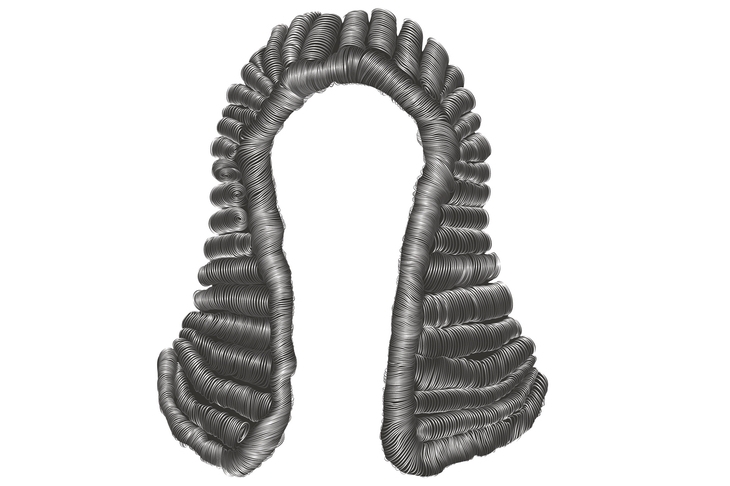From now on, barristers like me will no longer have to worry about calling a District Judge ‘Sir’ or avoiding clumsy expressions such as ‘Has Sir read the papers?’ in court. Nor will I have to wonder if I have to call a judge ‘Madam’, ‘Ma’am’ (to rhyme with dam) or ‘Ma’am (to rhyme with calm). Instead, all advocates, litigants and witnesses in England and Wales will now address most judges in court simply as ‘Judge’, after a new ruling from the Lord Chief Justice and the Senior President of Tribunals.
My reaction when I heard this news was mixed, as you might expect: lawyers have a reputation for ensuring that the simplest issue has at least two sides to it. We also have a reputation for being traditionalists, instinctively hostile to change. And lawyers have already this year contended with significant changes in nomenclature: we now have a King’s Bench Division, administered by His Majesty’s Courts and Tribunals Service; R now stands for ‘Rex’ in criminal prosecutions; and Queen’s Counsel are now King’s Counsel.
But while the changes arising from the death of Her Late Majesty the Queen were predictable, the more recent changes to how we address Judges are more surprising and, in my view, welcome. I have on occasions had to test pupils on how a barrister is expected to address various different types of Judge. ‘A male circuit judge sitting in open court in the Old Bailey?’ (My Lord.) ‘A female Circuit Judge sitting in the County Court?’ (Your Honour.) ‘A female High Court Judge sitting next to you on a train?’ (Judge.) During my career, I have experienced all three situations and the third was undoubtedly the most nerve-wracking, for me if not for her.
Like many elements of our constitution, there is no one place where all the rules can be found, even though the judiciary website has a helpful page entitled ‘What do I call a judge?’ Some things are staying the same. You will still call a High Court Judge and above ‘My Lord’ or ‘My Lady’ (never ‘M’Lud’ which I have only ever seen on the pages of Dickens). With circuit judges, it is ‘Your Honour’, male or female – unless you are in the Old Bailey, where circuit judges are always addressed as ‘My Lord’ or ‘My Lady’. Magistrates are still to be called ‘Your Worship’ or ‘Sir’ or ‘Madam’; though my pupilmaster told me never to use ‘Your Worship’ unless the magistrate in question happened to be the Mayor.
In my experience – and I generalise – judges these days are fairly relaxed about how they are addressed. I recall many years ago sitting next to a barrister who addressed a rather testy High Court Judge as ‘Your Honour’ when she should have called him ‘My Lord’. The Judge interrupted her and said, ‘Miss so-and-so, please do not forget that we are in the High Court.’ I cannot imagine any of the current Judges of the Family Division reacting in that way now. I happened to appear before Barbara Fontaine shortly after her appointment as one of the Masters of the Queen’s Bench Division. In those days, it was the custom to address these judges as ‘Master’, but the rules were unclear when it came to women. Barbara Fontaine kindly said, ‘Call me whatever you want, Mr Foster.’ Wisely, I decided to avoid calling her ‘Mistress’.
The only occasion I was told off happened to be when I met a learned Judge at a social gathering, and he stopped me the moment the word ‘Judge’ left my lips – telling me to use his first name instead. But that lack of formality felt odd, even in the setting of a pub.
It felt even odder on another occasion when, in court, I had to deal with a case in which some of the parties had serious cognitive difficulties. An expert there to assist them told the court that it would help enormously if we referred to each other in court by first names, with the circuit judge being called ‘Judge’ rather than ‘Your Honour’. The Judge rose willingly to the occasion, though it felt strange when she addressed me as ‘Julien’ in court; she was someone I had always seen as a stickler for formality. We barristers were also required in that hearing to strip unnecessary verbiage from our speeches. My view at the hearing’s end was that none of the essential features of fair decision-making had been lost. On the contrary, our names somehow reduced tension while not removing a sense of proper formality. The vulnerable parties there – those whom the decisions would most affect – had a greater chance of following what was happening.
But at least those vulnerable parties had their own lawyers. If I, a qualified practitioner, have found the minefield of names a difficult one to navigate, how much harder must it be for the litigant without a lawyer? The recent changes are intended to assist non-lawyers who are increasingly having to appear in court and make representations unaided. Some take to it easily, peppering their submissions with ‘Your Honour’ every so often. I have seen others struggle: although Judges in the King’s courts are the Sovereign’s representatives, no Judge is entitled to be called ‘Your Majesty’. I have even heard Judges addressed more chummily as ‘Mate’ or more patronisingly as ‘Love’. The advantage of adopting ‘Judge’ as a mode of address is that it is short, simple, clear, memorable and respectful.
There remains, for me, one burning question. When you talk to a Judge socially, you call them ‘Judge’. What if that Judge happens to be retired, happens to be the former Lord Chief Justice and whose surname happens to be ‘Judge’? As I discovered when I bumped into Igor Judge in a lift one day. I thankfully avoiding calling him Judge Judge. Helpfully, he did not mind in the slightest what he was called.






Comments